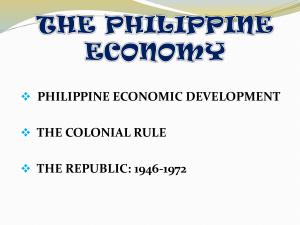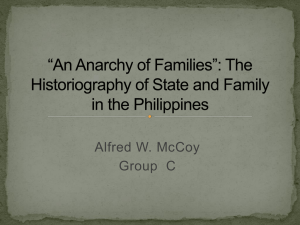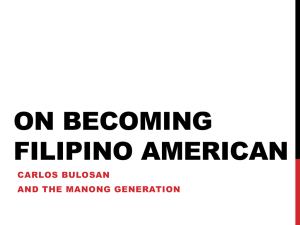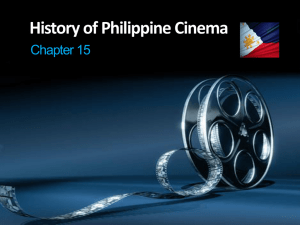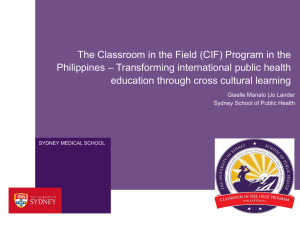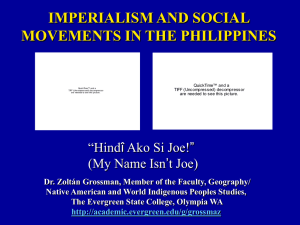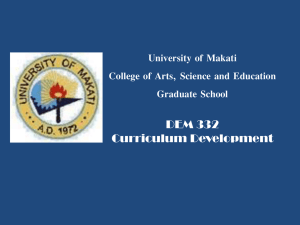anita leyson - School of Social Work
advertisement
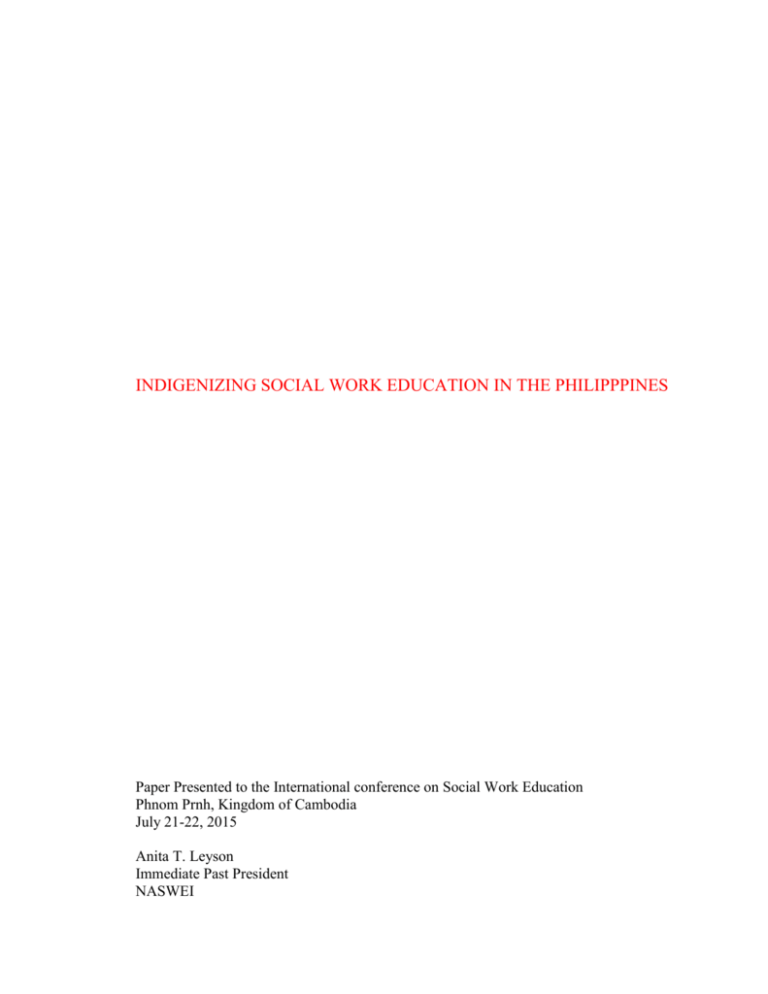
INDIGENIZING SOCIAL WORK EDUCATION IN THE PHILIPPPINES Paper Presented to the International conference on Social Work Education Phnom Prnh, Kingdom of Cambodia July 21-22, 2015 Anita T. Leyson Immediate Past President NASWEI National Association for Social Work Education, Inc. (NASWEI) The National Association for Social Work Education (NASWEI) is the association of schools of social work in the Philippines. It brings together all schools of social work in the Philippines in a concerted effort to pursue its mission of promoting and upholding social work education that is transformative and responsive to the changing times. It traces its beginning as Schools of Social Work Association of the Philippines (SSWAP) in 1969 as a result of a series of workshops on social work education primarily to take the lead role in crafting the Social Work undergraduate and graduate curricula. Its name was changed to National Association for Social Work Education, Inc. (NASWEI) in 1990 with the following objectives: 1) To promote and maintain a high standard of social work education and coordinate and collaborate with duly authorized agencies for accreditation; 2) Standardize social work curricula designed to prepare qualified professional social workers and paraprofessional social workers; 3) Serve as a national forum on issues related to the profession in general, and to social work education in particular; 4) Facilitate interschool sharing of manpower and facilities; and. 5) Encourage and promote research and the development of indigenous teaching materials other related learning resources. Today, NASWEI maintains a roster of 48 active regular members (social work schools) and more than a hundred associate members composed of faculty from schools of social work all over the country. The NASWEI is managed by a Board of Directors headed by a President, four (4) vice presidents representing four broad divisions of the country, namely, Luzon, National Capital Region, Visayas and Mindanao, a secretary, treasurer, and two associate members. The immediate past president sits as ex-oficio member of the board. Committees are formed to include member schools and individual faculty. The NASWEI as an association holds a convention every two years and a conference in the intervening year. The theme varies from year to year, but relevant and responsive to local and global realities with great implication to Social Work education and practice. NASWEI’s Academic Endeavour/Linkages Commission on Higher Education (CHED) that has authority to accredit schools of social work and other tertiary schools, review and approve professional programs of various disciplines. CHED has always been a potent force in the crafting of the graduate and undergraduate curricula. Conducted trainings on competency-based social work curriculum and coming up with standard guidelines. Lately, NASWI, in coordinaition with CHED conducted trainings on Outcomes-based curriculum. It is important to mention that the social work undergraduate curriculum undergoes regular review and revision whenever necessary with NASWEI, through a Technical Panel, working closely with CHED and the Professional Regulation Commission. Professional Regulation Commission whose functions, among others, include the provision of guidelines for the conduct of the licensure examination for social work graduates for admission into the Social Work profession, The examination is given yearly by the Board for Social Workers under authority provided by Republic Act 4373 or the Social Work Act of l965. Philippine Social Science Center, a private non-stock, non-profit organization of professional social science associations and research and instructional institutions in the country. NASWEI has hopes to continue consultation with the PSSC management for possible joint training and/or research. Asian and Pacific Association for Social Work Education (APASWE) in its effort to promote quality and responsive Social Work education in the region. Most recent engagement of NASWEI with APASWE was the Asia Pacific regional conference on Climate Change and Disaster Risk Reduction and Management that was held in Manila on June 4-6, 2013. On the other side of the partnership were the Philippine Association of Social Workers, Inc. (PASWI) and the International Federation of Social Workers – Asia (IFSW). The conference also saw the build up of partnership among nations in reducing the risk caused by naturally-caused disasters and emergency situations amidst climate change. Social Work Research Institute Asian Center for Welfare in Society, Japan College of Social Work, under the able leadership of a friend and colleague Dr. Tatsuru Akimoto, assisted by Kana Matsuo for the period September 2013 to February 2014. The research entitled “Social Work Education in the Philippines: Internationalization to Indigenization” delved into the development of SW education that traces its beginning from foreign-inspired social work practice using foreign theories. It also tried to find out to what extent SW education in the Philippines adopted and integrated foreign concepts and theories into its curriculum through the years, as well as efforts toward indigenization The result of the study was very encouraging. The first two decades of social work education in the Philippines was patterned after that of the West, owing to the fact that most of the first professionally trained practitioners in social work obtained their education in the United States. As such, it adopted the western curriculum of social work, and taught theories and concepts as they were taught abroad. Indigenization became a by-word in the country as early as in the 60”s. Gleaning from literature, defining the following terms was deemed necessary/ Indigenization. It is a genuine attempt to align the goals and thrusts of education to what is truly responsive and relevant to the country’s and people’s needs and situations; it is culture-based. But to understand indigenization it should be distinguished from two other related terms - authentization and de-westernization. Authentization, means identifying genuine and authentic roots in the local system upon which future development from within a country may be patterned. De-westernization is going through a process of transformation as one assesses his/her capability to break away from the original borrowed knowledge from the west. It means going through a transformative process of empowerment and strengthening of the people’s traditional natural capabilities and resources. Knowledge building to materialize should go through a process of transmission of knowledge from a foreign source, to indigenization and to authentization and dewesternization. It must be noted that prior to the holding of workshops on the use of indigenous materials in teaching, the Philippine School of Social Work, through its director, Dr. Angelina Almanzor, in 1968, entered into a joint research project with the Asia Foundation on the applicability of self-determination and confidentiality viewed within the value orientation of the Filipinos. Using vignettes that portray specific situations, the study came up with significant findings. The indigenization of SW education in the country took off at the beginning of the decade of the 70’s with a social framework toward development. Workshops were conducted to review the goals and content of the curriculum and teaching methodologies indigenization. to create awareness and support growing sentiments toward It was the workshop on the use of creative literature from the Philippine experience that made a strong impact in the area of indigenization. The years 1980’s to 2000 saw a number of publications by local authors to respond to the dearth of teaching materials in Philippine social work education. The clamor for local learning resources was borne out of a strong desire to test applicability of existing knowledge with a goal to build social work theory that is very Filipino. The growing sentiments toward indigenization of Social Work education led to the conduct of the workshop, “Creative Literature in SW Education: The Philippine Experiment,” on August 14-15, 1972 by the United Nations Economic and Social Commission for Asia-Pacific (UNESCAP) Regional Adviser on Training in SW and CD, Dr. Francis Maria Yasas, and UNICEF consultant Mr. David Drucker, in coordination with the Schools of Social Work Association of the Philippines (SSWAP). The aim was to develop and deepen appreciation for the use of creative literature in teaching as well as in in-service training with its focus on modern Philippine literature dealing on themes of human interest and relevance to SW education and practice. This was the beginning of revolutionizing the Social Work curriculum to give more emphasis to indigenization. It was, however, at the 1978 6thnational workshop on Social Work education that curricular changes were geared toward the use of Filipino-oriented concepts that started a deliberate attempt to examine the applicability and non-applicability of western concepts. The important role of Filipino values such as “damayan” (supporting each other), ”bayanihan” (cooperation), and“pakikiisa” (being in one with another), when used in the helping process, makes it easy to mobilize people to work together toward social transformation. In 1982. Social Work educators projected a10-year plan towards theory-building and indigenization of SW practice and education. The plan was premised on the value assumption that since social work is practice-based, social workers as applied scientists are challenged to be more critical and analytical, self-aware, and discriminating in their assessment of social work knowledge that comes from experience and practice. In an article in the Philippine Encylopedia of Social Work, the author touched one area that is close to the Filipino character, spirituality. It is the same Filipino faith that helps them cope with what seems to be an impossible situation. Referring to it as psycho-spiritual approach, the model espouses a sustained treatment approach with spiritual empowerment from within, driven by a Christ-centered relationship. It is healing through an empowered value system. A number of schools have also produced modules and monographs on social work values and practice. Most recent endeavour of NASWE is its partnership with UNICEF in a project entitled “”Enhancing Competencies of Local Government Units Social Workers in Social Work case management of CPIEs in Yolanda-affected areas” The project is now in its final stage and hopes to come up with the following output: Output: 1. A compendium of cases written by the LGU social workers from their cases to highlight authentic models of intervention in CPIE cases particularly separated and unaccompanied children during and after a naturally-caused disaster. The cases are evidences of the unique helping process in the Philippine context. Output 2. 2 sets of manual on case management, gleaning from the experiences of NASWEI in the training and coaching and mentoring of LGU social workers in Yolanda affected areas: one for social workers and another one for para-social workers. Theory-building has been a dream of NASWEI using cases and experiences documented by social workers in the field and analyzed within the framework of the socio-cultural situation of the country. Members of the association are hopeful full realization of indigenization would be soon. SALAMAT PO SA INYONG PAKIKINIG.. THANK YOU FOR LISTENING DEAR COLLEAGUES
